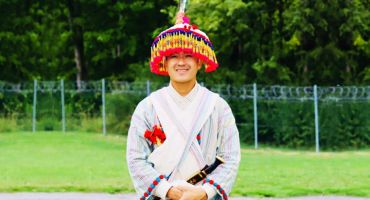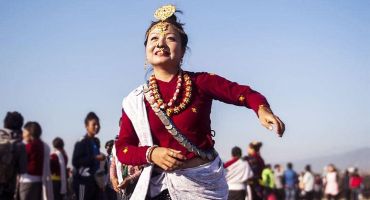In the 21st Century, an era of technological advancement and the age of the millennials, talking about tribal customs and traditions is sure to make you unmake friends. As younger people talk more about Instagram reels, YouTube shorts, and nanotechnology, it is seemingly difficult to get ethical and ethnical messages across the preoccupied minds of today’s progressive generation.
But sooner or later, for many young Khambus, the reality will crash in with a bang. The realization will dawn and they will begin to frantically search for the answers i.e. if their families still follow Khambu rituals and tradition. For most, seeking the help of the elders in the house will be an exercise in the collection of rhetorical proclamations that will make you feel alien to the Khambu world. The decades of conversions into different faiths, the internal strife created by cosmopolitan ideas, and rapid modernization, having taken a toll on the idea of being who you are, put one in a not-so-ideal situation to be in. But as a wise man, whose name escapes my memory at the moment, once said, “the quest for an answer is the beginning of wisdom”.
For young Khambus, the moment of realization usually begins when a member of the family leaves for another realm. ‘Sima’ or the passing away of a family member is a profound moment that also brings you to the humble understanding of life, as seen through the traditions of Khambus. The post-funeral ritual of “Lam-Pakma”, while providing a theatrical affair for the village audience, brings a cathartic experience for the bereaved family. It is the moment when you either feel spiritually connected or feel ostracized in the awakening moment of being Khambu.

If your young mind has thus awakened to the idea of being Khambu, then these are some rudimentary elements that are specific only to Khambus and those which one must be well versed in order to interconnect when you are in the universe of Khambu Rais.
1. Pachha
In a gathering of Khambus, the ultimate method amongst Khambus to break the ice is by inquiring about each other’s Pachha. And if you discover the other’s Pachha is the same as yours, then it calls for a celebration of finding an extended family member. The Pachha is the male hereditary lineage of a Khambu family.
2. Samet
While Pachha tracks a single bloodline ancestry, Samet identifies the origin of the whole clan. Therefore, identifying one’s Samet is necessary to carry out the rituals properly.
3. Samkha & Samkhalung
Every Khambu household practicing Khambu traditions must unequivocally have a Samkha which is a dedicated room containing sacred three upright hearthstones collectively known as Samkhalung. The importance of having these cannot be stressed more as every Khambu ritual begins and ends with the invocation of Khambu ancestors here.
4. Mangpa / Mangma
Mangpa or Mangma are the Khambu Shamans whose services are crucial to carrying out Khambu rituals. They are the divine children of the forest spirits and every Khambu must be aware of their importance in our society.

5. Mangkhim
Although Mangkhim is a recent addition to the post-modern Khambu world, there are ample pieces of evidence of it having existed in ancient Khambu history. Mangkhim can be generally translated as ‘the house of divine spirits’.
6. Mangsewa
Mangsewa is Khambu equivalent of Hindu “Puja”, Christian “Mass” or Islamic “Namaz”. Khambus offer prayers and oblations to the divine spirits and lineage ancestors during Mangsewa. In Khambu languages, the word ‘Mang’ means divine spirit and ‘Sewa’ is veneration.
7. Sakela
Today, Sakela is observed by Khambus throughout the world as a cultural festival. While that is acceptable for the most part, a Khambu must realize that Sakela is much more than just a cultural festival. It is the very foundation of being Khambu. Sakela is the bridge to understanding our bond with nature and the divine spirits.
There! When you are well versed in the above 7 topics you can comfortably reassure yourself on the journey of rediscovering your roots.
Once, a Khambu friend asked me matter of factly, “Isn’t my surname enough to identify me as a Khambu? Why should I prove myself further that I am indeed a Khambu?”
I told him, “Sure, but what use is the seed of a fruit tree that doesn’t sprout, grow roots, and bear no foilage and fruits?”





Leave a Reply